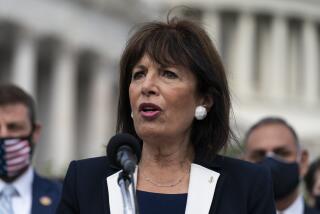Kerry May Be Driving, but He’s Yet to Signal
John F. Kerry’s dominating performance on Super Tuesday erased virtually all doubt about who will lead the Democratic Party in 2004. But it left open the equally important question of what direction Kerry will set.
Amid a Democratic presidential race that has turned less on issues than perceptions of the candidates’ personal qualities and electability, the Massachusetts senator stands as the presumptive nominee with many unsure whether he intends to steer the party to the left or back toward the centrist themes associated with Bill Clinton -- or impose no distinctive direction at all.
“It’s hard to make sense of who or what Kerry is, because he seems to be straddling all of the divides ... and nobody in the party has called him on it,” said Fred Siegel, a historian at the Cooper Union for the Advancement of Science and Art in New York and an expert on the modern Democratic Party.
On choices at home and abroad, Kerry portrays himself as an heir to the party’s most robust centrist traditions.
In foreign affairs, he says he will offer a “progressive internationalism” that builds on the “tough-minded strategy” championed by Presidents Franklin D. Roosevelt, Harry S. Truman and John F. Kennedy. On domestic policy, he aligns himself with party reformers who sought alternatives to traditional liberal and conservative philosophies -- an approach termed the “third way” under President Clinton.
“I’m still somebody who believes that the ‘third way’ concepts are very much there and available to us for a lot of different things,” Kerry said in a recent interview.
Much in Kerry’s record supports this self-portrait -- from his focus on reducing the federal budget deficit in the 1980s to his support for welfare reform and Clinton’s interventions in Bosnia and Kosovo during the 1990s.
But Kerry’s Senate record, and the message of his presidential campaign so far, offer support for Republican charges that he would return the Democrats to a pre-Clinton liberalism.
On most social issues, Kerry espouses more conventional liberal views than Clinton or Al Gore, the 2000 Democratic presidential nominee. That tilt is evident from his opposition to the death penalty in all cases except terrorism to his insistence that he would appoint only Supreme Court justices who support abortion rights.
And he faces questions about his threshold for using military force after voting against the 1991 Persian Gulf War and spending much of this campaign distancing himself from his vote to authorize the second war with Iraq.
Kerry’s agenda, and the way he describes it, seems shaped by two conflicting forces: the push for new approaches from Democratic reformers during the 1980s and ‘90s and the hunger for ideological combat with President Bush and the GOP among Democrats today.
Many of Kerry’s ideas reflect attempts by Clinton and others to reorient Democrats toward fiscal discipline, nonbureaucratic solutions to social problems and greater tolerance for use of military force.
But in other ways, Kerry’s agenda -- especially in such areas as trade and education policy -- is targeted at more traditional Democratic goals and preferences. In that sense, he is a product of his times. Many around him believe it inevitable that any nominee would produce a more partisan agenda today because the country and Congress are more polarized than when Clinton took office.
But if Kerry hasn’t entirely resisted that pressure, neither has he entirely surrendered to it.
On the economy, he still emphasizes ideas popular with centrists. He has stressed his commitment to fiscal discipline, pledging to halve the federal deficit in four years.
His ideas for accelerating job growth echo Clinton-era priorities as well. Kerry talks about direct government stimulus -- mainly by providing states $25 billion annually the next two years for homeland security and other needs -- and tax incentives to manufacturers and start-up companies to create new jobs. His healthcare plan would reduce premium costs for employers by shifting the bill for the most expensive patients to Washington.
“I really pride myself on being pro-business,” he said. “And I want businesses to grow, and I want to create wealth. I want to create jobs.”
Yet Kerry has almost entirely submerged that moderate approach beneath populist attacks on “Benedict Arnold corporations” that shift jobs overseas and pledges to battle “the lobbyists, the drug industry, big oil and HMOs.”
He has put flesh on that language by taking positions that please labor leaders and guarantee conflict with business on union organizing rights.
Qualifying his support for the North American Free Trade Agreement, Kerry has said he would review existing trade pacts -- and sign new ones only if they contain enforceable provisions to improve labor and environmental standards in developing countries.
Compared to his Senate record in the Clinton years, that stance represents a clear move left. But three years of job losses have changed the trade debate so much that in the Democratic presidential race, Kerry stood as a relative centrist next to John Edwards and Dick Gephardt, who denounced free trade more vociferously.
Again, compared to his Senate record, Kerry has moved left on education issues. Under Clinton, he was a leading voice among Democrats for reforms that would have tied additional federal funding to tougher accountability for teachers and principals.
“We can’t afford to be uncritical apologists for public schools that work for our bureaucrats but not for our kids,” Kerry said in 1998. In the same speech, he urged steps to help principals remove poorly performing teachers.
He has virtually shelved those ideas. Instead, he is now focused on the priorities of teacher unions, promising to increase educational funding by as much as 50% and make it easier for schools to get passing grades under the new education reform law even if students fail to improve in reading and math.
Still, in recent interview, Kerry indicated he would return to some of the school reform themes he sounded in the late 1990s. “I think you’ll see me staying on the course ... with these kinds of things,” he said.
Kerry’s message on foreign affairs has similarly oscillated between the centrist themes of the 1990s and the party’s more liberal views today. He began the campaign by pledging to pursue a “progressive internationalism.” But he spent much of the last year emphasizing dovish notes in response to attacks on his Iraqi war vote by Howard Dean, the onetime Democratic front-runner .
Now, while still promising to work more closely than Bush with allies, Kerry is sounding tougher. In a speech last week at UCLA, he highlighted his call for adding 40,000 troops to the Army. He also accused Bush of weakening America’s defense by overextending the military and failing to spend enough on homeland security. In remarks after the speech, he stressed his willingness to use the military -- particularly special forces -- against terrorists.
Aides say they expect Kerry to amplify these hawkish arguments. But it’s unclear whether they will eclipse the liberal complaints he raised against Bush during much of the primary campaign, when he accused the president of unilateralism and rushing to war.
Likewise, some around Kerry expect a greater stress on reforming schools, streamlining government and building bridges to business. But other supporters believe the electorate is so polarized that he would be better served trying to motivate the Democratic base with a message of populism, more domestic spending and skepticism about free trade -- the formula he applied to dominate the nomination race.
Probably the most likely outcome is that Kerry will present an amalgam. He’s offering neither a rejection nor a revival of Clinton’s policies, but a more combative synthesis that reflects the country’s new challenges and the demands of a party virtually unified in hostility to the Bush agenda.
“The center in public opinion has not shifted dramatically in the intervening years since Bill Clinton, but the Bush administration and the Congress have pulled the country rightward ... so it’s natural that Kerry and the Democrats will push back,” said Robert B. Reich, a liberal leader and Clinton’s first secretary of Labor.
“We will see a Democratic nominee emboldened in his agenda because the administration has moved so far [in the opposite direction].”
More to Read
Get the L.A. Times Politics newsletter
Deeply reported insights into legislation, politics and policy from Sacramento, Washington and beyond. In your inbox three times per week.
You may occasionally receive promotional content from the Los Angeles Times.






